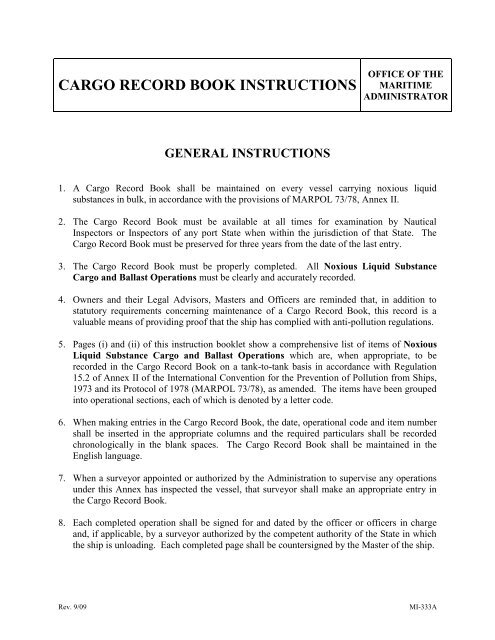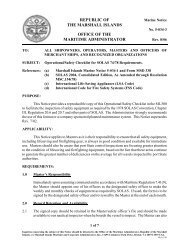CARGO RECORD BOOK INSTRUCTIONS
CARGO RECORD BOOK INSTRUCTIONS
CARGO RECORD BOOK INSTRUCTIONS
Create successful ePaper yourself
Turn your PDF publications into a flip-book with our unique Google optimized e-Paper software.
<strong>CARGO</strong> <strong>RECORD</strong> <strong>BOOK</strong> <strong>INSTRUCTIONS</strong><br />
GENERAL <strong>INSTRUCTIONS</strong><br />
OFFICE OF THE<br />
MARITIME<br />
ADMINISTRATOR<br />
1. A Cargo Record Book shall be maintained on every vessel carrying noxious liquid<br />
substances in bulk, in accordance with the provisions of MARPOL 73/78, Annex II.<br />
2. The Cargo Record Book must be available at all times for examination by Nautical<br />
Inspectors or Inspectors of any port State when within the jurisdiction of that State. The<br />
Cargo Record Book must be preserved for three years from the date of the last entry.<br />
3. The Cargo Record Book must be properly completed. All Noxious Liquid Substance<br />
Cargo and Ballast Operations must be clearly and accurately recorded.<br />
4. Owners and their Legal Advisors, Masters and Officers are reminded that, in addition to<br />
statutory requirements concerning maintenance of a Cargo Record Book, this record is a<br />
valuable means of providing proof that the ship has complied with anti-pollution regulations.<br />
5. Pages (i) and (ii) of this instruction booklet show a comprehensive list of items of Noxious<br />
Liquid Substance Cargo and Ballast Operations which are, when appropriate, to be<br />
recorded in the Cargo Record Book on a tank-to-tank basis in accordance with Regulation<br />
15.2 of Annex II of the International Convention for the Prevention of Pollution from Ships,<br />
1973 and its Protocol of 1978 (MARPOL 73/78), as amended. The items have been grouped<br />
into operational sections, each of which is denoted by a letter code.<br />
6. When making entries in the Cargo Record Book, the date, operational code and item number<br />
shall be inserted in the appropriate columns and the required particulars shall be recorded<br />
chronologically in the blank spaces. The Cargo Record Book shall be maintained in the<br />
English language.<br />
7. When a surveyor appointed or authorized by the Administration to supervise any operations<br />
under this Annex has inspected the vessel, that surveyor shall make an appropriate entry in<br />
the Cargo Record Book.<br />
8. Each completed operation shall be signed for and dated by the officer or officers in charge<br />
and, if applicable, by a surveyor authorized by the competent authority of the State in which<br />
the ship is unloading. Each completed page shall be countersigned by the Master of the ship.<br />
Rev. 9/09 MI-333A
Regulation 15<br />
Cargo Record Book<br />
MARPOL 73/78, ANNEX II, REGULATION 15<br />
(1) Every ship to which this Annex applies shall be provided with a Cargo Record Book, whether as part of<br />
the ship’s official log-book or otherwise, in the form specified in appendix 2 to this Annex.<br />
(2) After completion of any operation specified in appendix 2 to this Annex, the operation shall be promptly<br />
recorded in the Cargo Record Book.<br />
(3) In the event of an accidental discharge of a noxious liquid substance or mixture containing such a<br />
substance or a discharge under the provisions of regulation 3 of this Annex, an entry shall be made in the<br />
Cargo Record Book stating the circumstances of, and the reason for, the discharge.<br />
(4) Each entry shall be signed by the officer or officers in charge of the operation concerned and each page<br />
shall be signed by the master of the ship. The entries in the Cargo Record Book, for ships holding an<br />
International Pollution Prevention Certificate for the Carriage of Noxious Liquid Substances in Bulk or a<br />
certificate referred to in regulation 7 of this Annex, shall be at least in English, French or Spanish.<br />
Where entries in an official national language of the State whose flag the ship is entitled to fly are also<br />
used, this shall prevail in case of a dispute or discrepancy.<br />
(5) The Cargo Record Book shall be kept in such a place as to be readily available for inspection and,<br />
except in the case of unmanned ships under tow, shall be kept on board the ship. It shall be retained for<br />
a period of three years after the last entry has been made.<br />
(6) The competent authority of the Government of a Party may inspect the Cargo Record Book on board<br />
any ship to which this Annex applies while the ship is in its port, and may make a copy of any entry in<br />
that book and may require the master of the ship to certify that the copy is a true copy of such entry.<br />
Any copy so made which has been certified by the master of the ship as a true copy of an entry in the<br />
ship’s Cargo Record Book shall be made admissible in any judicial proceedings as evidence of the facts<br />
stated in the entry. The inspection of a Cargo Record Book and the taking of a certified copy by the<br />
competent authority under this paragraph shall be performed as expeditiously as possible without<br />
causing the ship to be unduly delayed.<br />
Rev. 9/09 MI-333A
LIST OF ITEMS TO BE <strong>RECORD</strong>ED<br />
Entries are required only for operations involving all categories of substances.<br />
(A) LOADING OF <strong>CARGO</strong><br />
1. Place of loading.<br />
2. Identify tank(s), name of substance(s) and category(ies).<br />
(B) INTERNAL TRANSFER OF <strong>CARGO</strong><br />
3. Name and category of cargo(es) transferred.<br />
4. Identity of tanks.<br />
.1 From:<br />
.2 To:<br />
5. Was (were) tank(s) in 4.1 emptied?<br />
6. If not, quantity remaining in tank(s).<br />
(C) UNLOADING OF <strong>CARGO</strong><br />
7. Place of unloading.<br />
8. Identity of tank(s) unloaded.<br />
9. Was (were) tank(s) emptied?<br />
.1 If yes, confirm that the procedure for emptying and stripping has been performed in accordance with<br />
the ship’s Procedures and Arrangements Manual (i.e., list, trim, stripping temperature).<br />
.2 If not, quantity remaining in tank(s).<br />
10. Does the ship’s Procedures and Arrangements (P & A) Manual require a prewash with subsequent<br />
disposal to reception facilities?<br />
11. Failure of pumping and/or stripping system.<br />
.1 Time and nature of failure;<br />
.2 Reasons for failure;<br />
.3 Time when system has been made operational.<br />
(D) MANDATORY PREWASH IN ACCORDANCE WITH THE SHIP’S PROCEDURES AND<br />
ARRANGEMENTS MANUAL<br />
12. Identify tank(s), substance(s) and category(ies).<br />
13. Washing method:<br />
.1 Number of cleaning machines per tank;<br />
.2 Duration of wash/washing, cycles;<br />
.3 Hot/cold wash.<br />
14. Prewash slops transferred to:<br />
.1 Reception facility in unloading port (identify port) * .<br />
.2 Reception facility otherwise (identify port).<br />
(E) CLEANING OF <strong>CARGO</strong> TANKS EXCEPT MANDATORY PREWASH (OTHER PREWASH<br />
OPERATIONS, FINAL WASH, VENTILATION, ETC.)<br />
15. State time, identify tank(s), substance(s) and category(ies) and state:<br />
.1 Washing procedure used;<br />
.2 Cleaning agent(s) (identify agent(s) and quantities);<br />
.3 Ventilation procedure used (state number of fans used, duration of ventilation).<br />
* Ship’s Master should obtain from the operator of the reception facilities, which include barges and tank trucks, a<br />
receipt or certificate specifying the quantity of tank washings transferred together with the time and date of the<br />
transfer. The receipt or certificate should be kept together with the Cargo Record Book.<br />
Rev. 9/09 i<br />
MI-333A
16. Tank washings transferred:<br />
.1 Into the sea;<br />
.2 To reception facility (identify port) * ;<br />
.3 To slops collecting tank (identify tank).<br />
(F) DISCHARGE INTO THE SEA OF TANK WASHINGS<br />
17. Identify tank(s).<br />
.1 Were tank washings discharged during cleaning of tank(s)? If so, at what rate?<br />
.2 Were tank washing(s) discharged from a slops collecting tank? If so, state quantity and rate of<br />
discharge.<br />
18. Time pumping commenced and stopped.<br />
19. Ship’s speed during discharge.<br />
(G) BALLASTING OF <strong>CARGO</strong> TANKS<br />
20. Identity of tank(s) ballasted.<br />
21. Time at start of ballasting.<br />
(H) DISCHARGE OF BALLAST WATER FROM <strong>CARGO</strong> TANKS<br />
22. Identity of tank(s).<br />
23. Discharge of ballast:<br />
.1 Into the sea;<br />
.2 To reception facilities (identify port)*.<br />
24. Time ballast discharge commenced and stopped.<br />
25. Ship’s speed during discharge.<br />
(I) ACCIDENTAL OR OTHER EXCEPTIONAL DISCHARGE<br />
26. Time of occurrence.<br />
27. Approximate quantity, substance(s) and category(ies).<br />
28. Circumstances of discharge or escape and general remarks.<br />
(J) CONTROL BY AUTHORIZED SURVEYORS<br />
29. Identify port.<br />
30. Identify tank(s), substance(s), category(ies) discharged ashore.<br />
31. Have tank(s), pump(s), and piping system(s) been emptied?<br />
32. Has a prewash in accordance with the ship’s Procedures and Arrangements Manual been carried out?<br />
33. Have tank washings resulting from the prewash been discharged ashore and is the tank empty?<br />
34. An exemption has been granted from mandatory prewash.<br />
35. Reasons for exemption.<br />
36. Name and signature of authorized surveyor.<br />
37. Organization, company, government agency for which surveyor works.<br />
(K) ADDITIONAL OPERATIONAL PROCEDURES AND REMARKS<br />
* Ship’s Master should obtain from the operator of the reception facilities, which include barges and tank trucks, a<br />
receipt or certificate specifying the quantity of tank washings transferred together with the time and date of the<br />
transfer. The receipt or certificate should be kept together with the Cargo Record Book.<br />
Rev. 9/09 ii<br />
MI-333A










